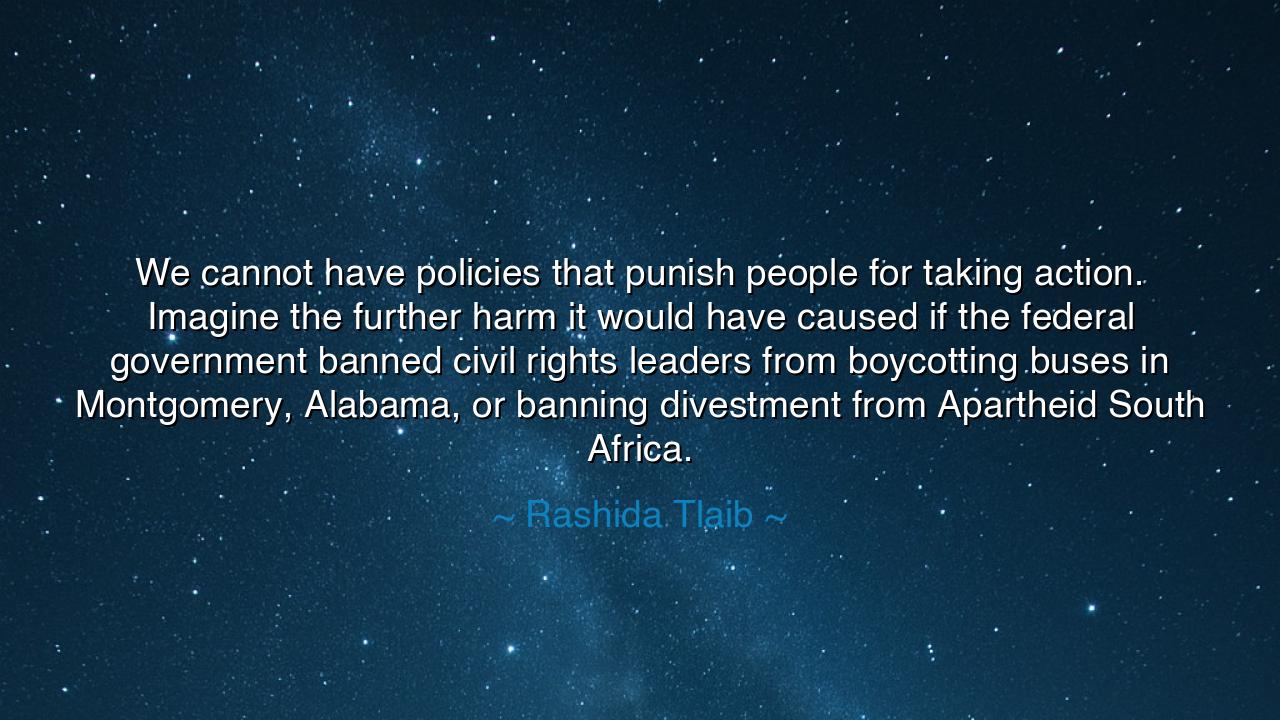
We cannot have policies that punish people for taking action.
We cannot have policies that punish people for taking action. Imagine the further harm it would have caused if the federal government banned civil rights leaders from boycotting buses in Montgomery, Alabama, or banning divestment from Apartheid South Africa.






In a time of unrest and awakening, when the voices of the people strain to be heard above the machinery of power, the congresswoman Rashida Tlaib spoke words that echo the ancient call for freedom and conscience:
"We cannot have policies that punish people for taking action. Imagine the further harm it would have caused if the federal government banned civil rights leaders from boycotting buses in Montgomery, Alabama, or banning divestment from Apartheid South Africa."
These words rise not as mere protest, but as remembrance — a warning forged from history and compassion. For Tlaib, whose life and lineage are marked by struggle and resilience, understands that progress is born not from compliance, but from courageous defiance. Her words remind us that justice has never been handed down by the powerful; it has always been claimed by those bold enough to act — to speak when silence was demanded, to stand when obedience was safer, to resist when resistance was condemned.
The meaning of her declaration is as clear as fire: freedom cannot exist where action is punished. To criminalize protest, to suppress the tools of peaceful resistance — boycotts, marches, and divestment — is to shackle the conscience of the people. Tlaib invokes the memory of the Montgomery Bus Boycott, that mighty act of nonviolent rebellion which began when Rosa Parks refused to surrender her seat to the chains of segregation. For more than a year, the Black citizens of Montgomery walked rather than ride, and their refusal brought a corrupt system to its knees. Had such resistance been outlawed, the moral progress of an entire nation might have been stifled, and the dream of civil rights delayed for generations.
In her second example, she summons the movement that helped dismantle Apartheid South Africa — the global campaign of divestment, in which citizens, churches, and universities withdrew their support from the regime of racial tyranny. Through peaceful means, the world declared that it would not profit from injustice. Tlaib reminds us that if governments had banned such acts of conscience, the world might still be complicit in that darkness. Her words carry the lesson that change is not born in comfort, but in confrontation — and that to silence resistance is to preserve oppression.
The origin of her insight lies not merely in history, but in the living tradition of democracy itself. For every age must decide whether it will nurture the voice of the people or fear it. The ancient philosophers taught that the health of a republic depends upon the freedom to dissent — that when citizens can no longer criticize power, the state has already begun its decay. From Socrates, who drank the hemlock for questioning false gods, to Frederick Douglass, who declared that “power concedes nothing without a demand,” the pattern is eternal: the advancement of truth always begins as disobedience.
In invoking these examples, Tlaib does more than defend the right to protest — she defends the moral soul of a free society. For a government that fears its people’s conscience will soon come to fear their knowledge, their voice, and their hope. And when that fear hardens into law, it transforms democracy into domination. She warns that when power begins to punish those who act from conviction, it betrays its purpose — for government exists to protect liberty, not to contain it.
There is, too, in her words, a whisper of prophecy. For the danger she names is not distant — it is here, in our own time, when voices of protest are too easily branded as dangerous, when calls for justice are mistaken for threats. She reminds us that the right to dissent is not a privilege granted by rulers; it is the breath of democracy itself. Without it, truth withers and tyranny grows. To silence protest is to suffocate the spirit of progress, for every movement toward justice — civil rights, suffrage, labor, climate, peace — began with those willing to bear the weight of disobedience.
Let the listener, then, draw strength from this teaching. Do not fear the accusation of being troublesome when you stand for what is right. Remember that every act of moral courage was once condemned by the comfortable and the complacent. The freedom to act — to speak, to boycott, to resist — is the heartbeat of humanity’s long journey toward equality. Protect it, even when it protects those with whom you disagree, for liberty, once denied to any, is soon denied to all.
Thus ends the teaching: governments are held together not by power, but by principle; not by obedience, but by truth. Let the people act with conscience, and let no law punish them for it. For only through action does justice breathe, and only through resistance does freedom endure.






AAdministratorAdministrator
Welcome, honored guests. Please leave a comment, we will respond soon